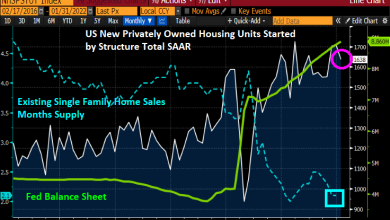ECB Shouldn’t Exit Stimulus Before Gauging War Impact, Rehn Says

(Bloomberg) — The European Central Bank should take time to properly assess the implications of Russia’s war in Ukraine before continuing its exit from pandemic-era support for the euro-zone economy, according to Governing Council member Olli Rehn.
Most Read from Bloomberg
Rehn, who heads Finland’s central bank, said additional stimulus isn’t required given the continent’s robust rebound and strengthening labor market. Instead, “prudence and optionality” are warranted so premature monetary tightening doesn’t trigger a recession, he said.
“The direction of normalization is still, in my view, appropriate,” Rehn told Bloomberg Tuesday. “The economic recovery is relatively strong and employment is increasing. However, given the new situation, we need to take a moment of reflection as regards the speed and way of a gradual normalization of monetary policy.”
Money markets pushed back wagers for a rate hike to March 2023 from January, having bet just weeks ago on two quarter-point increases by year-end.
Before a Governing Council meeting next week that was expected to focus on record-high inflation, ECB policy makers are busy weighing the knock-on effects of Russia’s invasion and the sanctions enacted on President Vladimir Putin’s government in response.
At 5.1% — more than double the 2% target — euro-area price gains could accelerate further still if the fighting disrupts energy supplies, and there are increasing fears that economic expansion will take a hit as consumers are squeezed.
“In this kind of a situation, it’s usually better to wait with your decisions until your sight clears so that you avoid doing damage,” said Rehn, who’s among the Governing Council’s more dovish members and has repeatedly cautioned against sudden shifts in policy. “We would risk a slowdown or even a recession in Europe if we acted in a premature manner.”
Italy’s 10-year yield slumped 26 basis points to 1.44% — almost erasing the advance that followed the ECB’s hawkish pivot last month.
Rehn’s suggestion that the war in Ukraine delays, rather than derails, the ECB’s departure from large-scale asset purchases and negative interest rates chime with remarks from some of his colleagues. That reduces the chances of further decisions on the retreat being taken next week.
Austria’s Robert Holzmann said in an interview that the central bank is moving toward normalization, though “may now be somewhat delayed.” Portugal’s Mario Centeno backs that policy direction but warned about the possibility of stagflation.
Until last week, officials had planned to use this month’s meeting to firm up the retreat from crisis-era support, with some publicly advocating for rate increases this year. That debate is now on hold.
“I wouldn’t be very keen on discussing when the first rate hike might take place,” Rehn said. “Once we have taken our moment of reflection, we will have time to ponder what is the appropriate time for that.”
Policy makers have stressed that any action will depend on incoming economic data, with updated ECB staff projections for growth and inflation through 2024 due at this month’s meeting — even as global events make forecasting ever trickier.
President Christine Lagarde has cautioned against drawing hasty conclusions while promising the ECB will “take whatever action necessary” to ensure price and financial stability in the 19-nation currency bloc.
With bond-buying slated to be phased out, Rehn said it’s important to maintain flexibility in the event of significant divergence between nations’ bond yields, as well as to ensure that monetary policy can be effectual in all corners of the region.
Running the ECB’s pandemic program alongside regular asset purchases has been effective and appropriate during the crisis, he said.
“In a monetary union like the euro zone, it’s important to have both instruments in your toolbox — even if you wouldn’t necessarily have to use them all the time,” Rehn said.
(Updates with interest-rate bets in fourth paragraph.)
Most Read from Bloomberg Businessweek
©2022 Bloomberg L.P.
Source link





